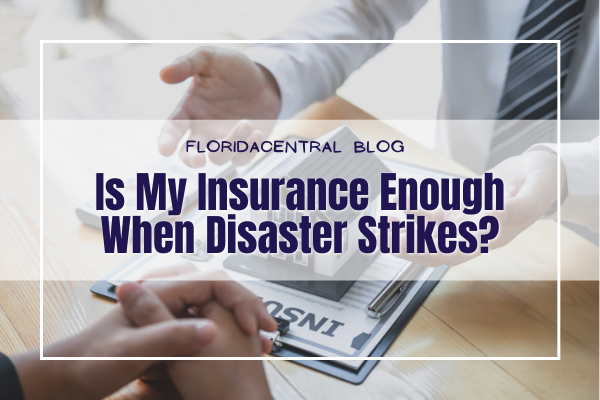Is My Insurance Enough When Disaster Strikes?

Q: The news coverage of hurricane season has me worried. What can I do to disaster-proof my home?
A: Natural disasters can be frightening. Whether it’s hurricanes, tornadoes, earthquakes, droughts or floods, no area of the country is immune to them. Whether you were personally affected by the most recent hurricanes or not, they should serve as a good reminder to take steps to prepare yourself for the worst.
Of course, disaster preparedness is a big topic. Keeping supplies on hand for emergencies is always a good idea, as is having a plan in place should disaster strike. The Federal Emergency Management Agency (FEMA) has a detailed guide for improving personal preparedness you can obtain at Ready.gov.
When it comes to your home, though, there are a few steps you can take to make sure you’re prepared for the financial fallout of a natural disaster. Most people depend on insurance to cover them, but there are a few cases where that may not be enough. Read on for three insurance pitfalls and what you can do about them.
1. Natural disaster exemptions
The pitfall: Many insurance policies specifically exclude natural disasters, or are very selective about the kind of damages they will cover as a result. For example, some policies won’t cover damage caused by wind-blown objects, even if they are directly related to a storm. For storm damage, many policies will only cover the damage caused by the actual wind or water. General policies almost never cover flood damage of any kind. Earthquakes, too, are on the list of general exclusion from homeowners insurance policies. In short, if you’re depending on your general homeowners insurance, you may be unpleasantly surprised.
The solution: It may be necessary to purchase specific insurance to cover natural disasters that are likely to affect your area. If you live in a floodplain or coastal region, speak to your insurance agent about flood insurance. If you live in a part of the country where damaging winds and storms are common, seeking out storm-specific insurance may be worth your while. At the very least, familiarize yourself with your policy before disaster strikes. Sit down with your agent and figure out what your insurance will actually cover.
2. Unmaintained trees
The pitfall: Much storm damage may be caused by fallen trees. Those same lovely trees that provide shade and attractive landscaping the other 364 days of the year can wreak havoc on your roof, fence or car — and maybe all three. Worse yet, you may be on the hook for the damages. Insurance companies will claim that the damage caused by fallen trees was inevitable, and therefore not caused by natural disaster. If you haven’t maintained those trees, that alone can be used as a reason to deny your claim.
The solution: Obviously, the answer to this problem is good maintenance. It might be wise to hire a professional arborist to provide an inspection and assess the level of risk they pose, so it’s documented. If they tell you there’s nothing wrong before the storm, you’ll have leverage with the insurance company.
3. Mortgagee clauses
The pitfall: Most insurance claims are just between you and the insurance company. After all, no one else has a vested interest in your car, your personal property or your health. When it comes to your house and property, though, the mortgage holder is part of the process. Insurance is responsible for covering the loss of a mortgage holder first, which means you’ll need their permission before you can be made whole in the event of a disaster.
It’s unlikely that a mortgage holder would object to your insurance claim out of spite, but they may not be immediately able to respond to the insurance company. They’ll have many similar claims to examine, and this can delay your payments, leaving you out of a house in the meantime.
The solution: There’s no easy way around this, since mortgagee clauses are almost universal in homeowners policies. The best solution is to practice a form of self-insurance. This means keeping your rainy day fund well stocked to cover emergency home repairs. While you’ll be able to refill the fund once the insurance paperwork is processed, being able to give the go ahead to contractors for needed home repairs is an incredible advantage in the event of a disaster. It’s better than borrowing the money, because your insurance company won’t reimburse you for interest accrued until you get your claim check. There’s no better alternative to having savings on hand to deal with disasters, so make it a part of your preparedness plan.
Learn More

